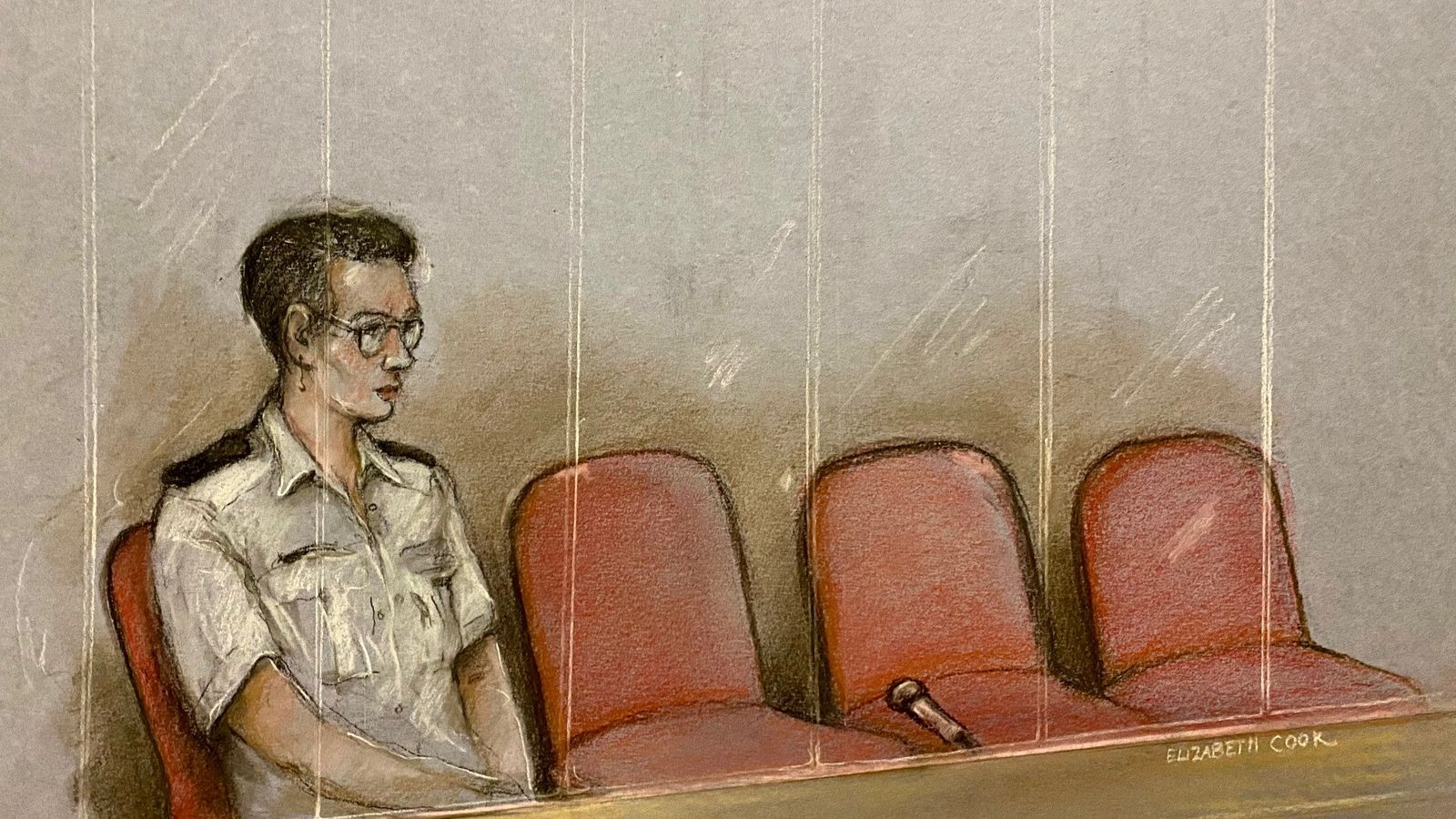Child killer Lucy Letby’s refusal to attend court for the conclusion of her trial has sparked outrage – and calls for changes in the law.
Letby, who was found guilty of murdering seven newborn babies and attempting to murder six others, was only present for two of the four days verdicts were delivered – and refused to return to the dock for her sentencing.
Some of the victims’ families, campaigners and the prime minister have described her behaviour as “cowardly” and a “slap in the face”.
Please use Chrome browser for a more accessible video player
What are the rules?
The rules around defendants appearing in court are laid out in guidance from the Crown Prosecution Service (CPS).
There are no laws that make it a legal obligation – but the default is that they are expected to attend.
Some of the families in the Letby case along with Cheryl Korbel – the mother of nine-year-old Olivia Pratt-Korbel who was shot dead by Thomas Cashman – are calling for a new law that would close the loophole.
According to the CPS, there may be a good reason for the defendant not to attend court – for example if they are unwell or claim to be unwell.
Felicity Gerry KC, an international barrister and professor of legal practice, tells Sky News often young people do not attend court for fear that they won’t get bail and will therefore lose their homes and be sent straight to prison.
But when there is deemed to be no good reason, the judge can make an order to compel them to attend.
If they are on bail this will mean a warrant for their arrest so they can be brought to court. If they are already in custody, they can order the prison governor where they are being held to get their officers to “use force to secure attendance”.
Please use Chrome browser for a more accessible video player
What happens when force is used?
If both the judge and the prison governor have agreed the prisoner should attend, a team of typically three prison officers will be sent to their cell door, according to Ian Acheson, a former prison governor and Home Office official.
Once they explain the judge has made the order, most people comply, he says.
“If it’s made clear to the offender that they’ll be going to court, you exclude the possibility of refusal for around 95% of them. You get a bit of a feedback loop where they accept it’s going to happen.
“And guilty people who experience and express remorse usually want the opportunity to be able to see or speak to their victims or their families.”
But if “persuasion fails”, Mr Acheson explains: “That person would be physically restrained with the purpose of putting them in handcuffs.”
He adds: “Force is a very tightly governed thing. But prison officers have all the same powers as a police constable at that point and can use the same force as they can.”
In the face of violence, officers are dressed in personal protective equipment and can also use leg restraints.
They then take the prisoner in handcuffs to a prison van so they can be driven to court and placed in cells inside the court building.
Please use Chrome browser for a more accessible video player
Why might a prisoner still not come to the dock?
Even once prison staff have driven the defendant to court, they can still refuse to leave the cells.
“The judge would be informed the prisoner has resisted,” Mr Acheson says. “But then in theory it’s for the judge to then say: ‘I care’ or ‘I don’t care – bring them to court’.”
Reasons for not forcing them to the dock include the risk they could use the opportunity to “retraumatise victims” or “turn it into a circus”, which can often be the case among terrorists, according to Mr Acheson.
Wendy Joseph, a former Old Bailey judge, tells Sky News judges try to avoid these situations at all costs as they can be “devastating” for victims’ families.
But Mr Acheson believes that current guidance allows defendants to manipulate the system.
“As far I understand the discretion rests with the offender, which is morally wrong. The principle needs to belong to the judge – not the perpetrator”.
Read more:
Who was Lucy Letby?
How did the police catch neo-natal nurse?
Letby’s crimes ‘very similar’ to Angel of Death murders
He adds while some argue forcing people to appear is “uncivilised”, in the case of Letby, he believes: “It’s more uncivilised to murder babies.”
“The occasions where it would be inappropriate are tiny in my opinion – and in Letby’s case there’s nothing significant that speaks to that.”
Professor Gerry, however, says the system needs to keep a sense of humanity for defendants – as well as victims.
“We’re not a country that shackles people and drags them to court as some kind of medieval practice. Reasons for refusal can be very complicated. I think it’s very dangerous to start calling for people to be forced to court.”
Why is sentencing so important?
Guidance on compelling people to come to court varies according to the offence and point in proceedings.
Mr Acheson says that in line with fair justice principles – judges should only be able to demand attendance once someone has been convicted, which means they wouldn’t have to be there for the verdicts being delivered.
Sentencing hearings are among the “most significant” for victims and their loved ones, because recently introduced impact statements allow them to show the perpetrator the effect their crimes have had on them.
And in the Letby case, this form of restorative justice is particularly important, Mr Acheson adds.
“People have been so grievously harmed by her – they deserve to look her in the eye and say ‘this is what you’ve done to me’.”
Judge Mr Justice Goss said in his sentencing remarks Letby will be given a transcript of them – along with the victim impact statements.
Please use Chrome browser for a more accessible video player
So what could be changed?
In recent years a trend has emerged of criminals refusing to attend court – despite the serious nature of their crimes.
Examples include Koci Selamaj, who did not attend his sentencing for the murder of Sabina Nessa in London, and Cashman, who refused to appear after killing Olivia Pratt-Korbel in Liverpool.
Her mother’s Face The Family campaign is calling for the legal loophole to be closed.
Children’s minister Claire Coutinho has told Sky News “more law is probably required”. “The justice secretary [Alex Chalk] said he’s very committed to making sure these laws are in place,” she said.
Former Justice Secretary Robert Buckland said the new Victims and Prisoners Bill – which is going through parliament – could provide the answer.
He suggested this could include forcing defendants to watch proceedings via video link from their cells – something Mr Acheson describes as a “silly distraction”.
Legal commentator Joshua Rozenberg said the only options available are dragging people by force – or threatening them with longer prison sentences – neither of which he agrees with.
“There’s no point in imposing a prison sentence on someone who’s going to be in prison for the rest of their lives,” he told Sky News.








